Why Using Your Voice Matters
Guest Blog by Dov Rubin
The act of creating sound—whether through a melody, a sustained humming, or some other tone generated by the body—has the ability to bypass the intellect and tap into a deeper, more intuitive part of ourselves where emotions and truths can emerge naturally. At its core, vocalizing serves as a bridge to one's inner spirit. This process fosters a profound connection to our inner essence, revealing insights and a sense of wholeness that words alone cannot convey.
Classes in singing and drumming illuminate how music can transcend technique and performance to become a pathway to deeper self-awareness, emotional expression, and communal harmony. Accessing layers of thought, emotion, and awareness that lie beyond our everyday, conscious mind can lead to greater self-understanding, emotional release, and a sense of alignment with our core values and desires. People often seek this connection to feel more authentic, reduce inner conflict, and experience a sense of wholeness. Vocalizing can make this process more tangible by creating a direct, embodied link to these internal states, fostering clarity and inner peace.
Spirit House serves a diverse group of individuals united by their shared desire to overcome personal shadows and evolve spiritually. With its aim of building a community of individuals seeking a deeper connection to spirit, it provides the perfect environment for this work. By bringing unconscious emotions and patterns to the surface, the physical act of vocalizing taps into primal energies, bypassing mental defenses, and allowing individuals to confront suppressed fears or limiting beliefs. As participants explore their voices, they may encounter resistance or vulnerability, offering opportunities for self-reflection and healing. Spiritually, vocalizing connects individuals to the present moment, fostering a sense of unity with the universe, and creating a pathway to transcend ego-based limitations and align with a greater sense of purpose.
This connection is not unique to Western practices; it is echoed in non-Western music such as Indian raga singing, African call-and-response traditions, and Tibetan overtone chanting. Kirtan, a devotional practice from the Indian spiritual tradition, often uses call-and-response singing to evoke profound emotional and spiritual states, fostering a sense of unity and devotion. And then there are the Shipibo people of the Amazon, who employ Icaros, or healing songs, in their ayahuasca ceremonies to guide and harmonize energies, creating a deep connection to the natural and Spirit worlds.
These traditions view the voice as a sacred instrument, capable of healing, transformation, and communion with the divine. By drawing inspiration from these indigenous practices, I help participants experience how vocalizing can ground them in their inner truths while also connecting them to the spiritual and/or universal truths that lie beyond the concerns of daily life that take up so much of our mental space.
Each class begins with warmup exercises to prepare the body and voice. We then move on to practice songs from the Spirit House songbook, a compilation of songs often sung in plant medicine ceremonies. The latter half of the class is dedicated to free-form improvisation, where participants listen deeply to their own voices and each other. This practice can produce moments of rich harmony and rhythms—though we may enter the realm of cacophony along the way!
After graduating from Berklee College of Music in 1981, I spent several years as a musical director for theater productions and accompanist to cabaret singers. For both of these roles, I guided vocalists through the emotional and technical aspects of their performances. This included selecting appropriate music, arranging vocal harmonies, and coaching singers to enhance their vocal technique, expression, and stage presence. Working with performers in this capacity provided me with insight into the nuances of singing, from breath control and pitch accuracy to the importance of connecting with an audience through sound. These experiences have greatly informed my approach to teaching vocalizing at Spirit House, emphasizing the transformative power of using one's voice to convey emotion and foster connection.
A chance introduction to Spirit House led to my enrolling in courses that touched upon the profound link between vocalizing and spirit. My involvement began as a client of its founder, Justin Levy, exploring his form of energy work and the spiritual principles underlying it. Inspired by this revelation, I felt called to contribute to Spirit House through the medium I know best: the voice.
Teaching vocalizing at Spirit House is a natural progression in an ongoing life journey that intertwines my passions for music, personal growth, and community building. It’s a role that draws not only on my professional training but also on my spiritual values and aspirations. My teaching style is warm, friendly, and informal, creating an atmosphere where participants can explore their voices without fear of judgment.
Among other sources of inspiration, I draw upon the principles of Pauline Oliveros and her sonic meditations, which encourage deep listening and mindful presence. It’s a privilege to combine my experience and passion and blend my musical background and commitment to spiritual exploration with this work. And it is enormously gratifying to witness the profound impact vocalizing can have on individuals and communities. I invite you to join me in using our voices to enhance our growth and connection to Spirit.


